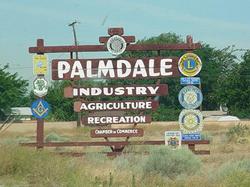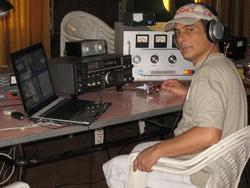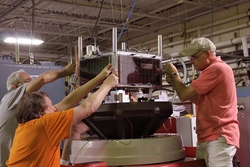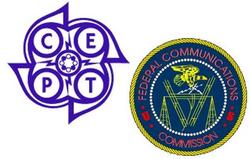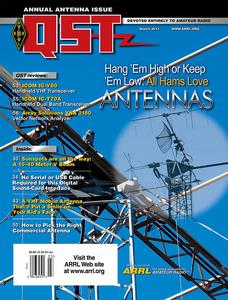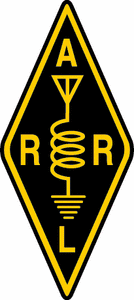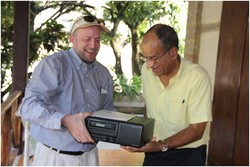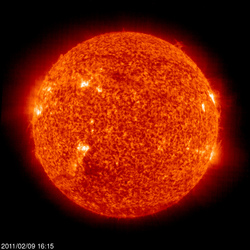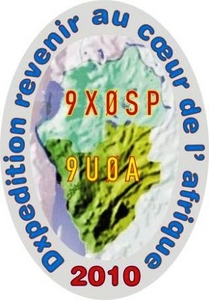 February 10, 2011 John E. Ross, KD8IDJ, Editor
| ||||||||||||||
+ Amateur Radio and the Law : Mixed Decision from the California Court of Appeals in Palmdale, California Antenna Case On January 27, the California Court of Appeals, Second Appellate District, issued its Opinion in the antenna case of Alec Zubarau, WB6X. In several respects, it is a win for Amateur Radio in California; however, the Court decreed that Zubarau was not entitled to his HF antenna, and said that his vertical antenna would suffice as a substitute for it.
The Court found that the Palmdale antenna ordinance, as it pertained to the height limit for vertical antennas, was "unenforceable" because it allowed a radio amateur to have a vertical antenna up to 75 feet high when measured from the ground but limited the "active element of the antenna array" to 30 feet. The ordinance did not define "array" or "active element" and did not specify from where the 30 permitted feet for such "array" was to be measured. The Court found that if even one reasonable interpretation of the ordinance could be found, the ordinance could be upheld, but that in this case, no one could understand what the limitations were and how they could be applied. That portion of the City's ordinance was therefore unconstitutional and unenforceable. Read more here. + Board of Directors: ARRL Board Sets Legislative Agenda at 2011 Annual Meeting
The ARRL Board of Directors held its 2011 Annual Meeting January 21-22, 2011 in Windsor, Connecticut, under the chairmanship of President Kay Craigie, N3KN. At the meeting, the Board set the legislative agenda for the current Congressional session, approved the 2011 operating plan, looked at the benefits of electronic publishing of ARRL periodicals and more. Read more here. + On the Air: The ARRL International DX CW Contest Is Just One Week Away!
The weekend of February 19-20 is prime time for CW DXing as the 2011 ARRL International DX CW Contest takes to the airwaves. According to ARRL Contest Branch Manager Sean Kutzko, KX9X, stations in the US and Canada work only DX stations -- Alaska and Hawaii are considered DX for this contest -- and DX stations only work the US and Canada. DX stations will be trying to make QSOs with all US states and Canadian provinces. The contest exchange is simple: US and Canadian stations send a signal report and their state or province, while DX stations send a signal report and the amount of power they are transmitting with. Read more here. + Amateur Radio in Space: ARISSat-1 to Be Deployed from ISS Next Week; Watch Live on NASA TV Expedition 26 Flight Engineers Dmitry Kondratyev and Oleg Skripochka, RN3FU, will step outside the International Space Station (ISS) on Wednesday, February 16. While in space, they will install and retrieve experiments on the Russian segment of the complex and deploy ARISSat-1, a small ham radio satellite. NASA TV coverage will begin at 6:45 AM (CST), while the extra-vehicular activity -- commonly called a spacewalk -- will begin about 30 minutes later. The spacewalk will be the second for Kondratyev, who will wear the spacesuit marked with red stripes, and the third for Skripochka, who will wear the suit with blue stripes.
During the nearly six hour spacewalk, Kondratyev and Skripochka will deploy an experiment called ARISSat-1, a boxy 57-pound nanosatellite that houses congratulatory messages commemorating the 50th anniversary of Yuri Gagarin's launch to become the first human in space. The ham radio transmitter will enable communications with Amateur Radio operators around the world for three to six months. It is the first of a series of educational satellites being developed in a partnership with the Radio Amateur Satellite Corp, the NASA Office of Education International Space Station National Lab Project, the Amateur Radio on the International Space Station (ARISS) program and RSC-Energia. The two cosmonauts will also install two experiments: One will collect information useful in seismic forecasts and earthquake predictions, and the second will look at gamma splashes and optical radiation during terrestrial lightning and thunderstorms. The spacewalkers also will retrieve a pair of panels exposed to space as part of an experiment to identify the best materials for building long-duration spacecraft. You can watch live online on the NASA TV Public and Media channels, or on your television set. Contact your local provider for the NASA TV channel in your area. -- Thanks to NASA for the information FCC: FCC Adds New Country to CEPT Reciprocal Agreement for Amateurs
On Monday, February 7, the FCC released a Public Notice, adding a new country to the CEPT reciprocal operating arrangements for US citizens who hold an FCC-issued General, Advanced or Amateur Extra class Amateur Radio licenses. US hams may now operate in Montenegro, as well as the other countries covered by the European Conference of Postal and Telecommunications Administrations (CEPT), subject to the regulations in force in the country visited, to operate in those countries. CEPT has also set up Web sites that list all countries covered by reciprocal agreements. Read more here. + Get Ready for the March Issue of QST! The March issue of QST -- our annual antenna issue! -- is jam-packed with all sorts of things that today's Amateur Radio operator needs. From product reviews to experiments to contesting -- including antennas you can build yourself as well as a guide to buying your first commercial HF antenna -- this issue of QST has something for just about everyone.
With a multitude of articles on antennas -- ranging from antennas for HF, VHF and even antennas for hams with limited space, you are sure to find something to fit your needs. In his article "A Four Wire Steerable V Beam for 10 through 40 Meters," Sam Moore, NX5Z, shows how you can put a strong signal across the upper HF spectrum just where you want it. And if you're into the low bands? If your property doesn't have space for Beverages, check out "A Roof Mount for a Rotatable 160 Meter Receiving Loop" by Steve Lawrence, WB6RSE. And now that your antennas are up in the air, how do you make sure that they are tuned correctly? Check out "Using a Noise Bridge and Spectrum Scope to Adjust Your Antenna Tuner" by Walter G. Mellish, KC2KZJ, to learn how to measure and adjust your antenna without putting a signal on the air. Amateur Radio has long been a partner on airplane and hot air balloon flights. But what about hang gliding? Join Bill Schell, W4UHE, and get the hang of operating while gliding in "Hang Gliding with Ham Radio." With all of today's social networking capabilities, conversation is a lost art. QST Editor Steve Ford, WB8IMY, takes a look at this in his article "The Art of Conversation." And speaking of conversation, many hams enjoy chatting on their local repeater system, but getting frequencies, offset and tone into VHF FM transceivers can be a challenge. In his article "Making Memories -- Programming Your Local Repeaters," Sumner Weisman, W1VIV, presents some ways to make this a bit easier. ARRL Contributing Editor Rick Palm, K1CE, takes a look at the ICOM IC-80 handheld VHF transceiver and the ICOM IC-T70A handheld dual band transceiver in this month's Product Review. He calls the IC-80 a "rugged 2 meter handheld with attractive features for emergency communications, as well as daily use." In looking at the IC-T70A, Palm said this radio "is a solid dual band handheld transceiver that includes a wide range of features, yet is easy to operate." QST Contributing Editor Phil Salas, AD5X, checks out the Array Solutions VNA 2180 vector network analyzer. He says that it "brings powerful vector network analyzer capabilities to the home workshop. It harnesses the power of your computer for control and display functions, bringing the cost to a level comparable to surplus commercial equipment with unknown issues or accuracy." Of course, there are the usual columns you know and expect in the March QST: Happenings, Hints & Kinks, The Doctor Is IN, How's DX, Technical Correspondence, Vintage Radio and more. Look for your March issue in your mailbox. QST is the official journal of ARRL, the national association for Amateur Radio. QST is just one of the many benefits of ARRL membership. To join or renew your ARRL membership, please see the ARRL Web page. Focus on Youth: ARRL Seeks New Youth Editor
The ARRL has a proud tradition of promoting youth involvement in Amateur Radio. One of the ways we involve young people is through our Youth Editor. This person is responsible for writing a monthly column for the ARRL website about youth and youth activities within the Amateur Radio Service. We are looking for a new Youth Editor. Do you know of someone who would be a good fit for this position? Maybe they hold leadership positions either in their Section or in their local club. The candidate must be an ARRL member and must keep their membership current throughout their tenure in the position. He or she will be required to write a monthly column of at least 1000 words and provide a minimum of three pictures (with captions) for each. For this, they will receive a small stipend for each column. Read more here. Happy Valentine's Day: Love Is On-the-Air Every once in a while, we will feature a story written that has been sent to us by a ham. This is one of those times. We hope you enjoy it. Life can be funny at times. In high school, I was one of those kids who kept to themselves. I was so into the academic side of things that I only went out with a few girls. But there was one girl in school who every time she walked by, my heart would skip a beat. I never saw her with a boyfriend; she was one of the prettiest girls in school and all the guys were too afraid to ask her out. In our senior year, we had a math and English class together, and when we graduated, I joined the Navy.
I saw the world in the Navy. I spent some time overseas and from time to time, I wondered about that beautiful girl who I never asked out in high school. I was too busy with my naval career to settle down, always on the move with Special Ops. I spent 25 years in the Navy and when I retired, I was ready for my next career. I had some radioman experience in the Navy, so I got my Amateur Radio license and started work at a major communications company. Years later, I found myself at a hamfest, looking for some new radio gear. I saw this radio I wanted back when I was a kid. I saw a guy pick it up and start to look at it. I ran over to the booth and waited for him to put it back on the table. He finally walked away so I asked how much the radio was and if it worked. The lady behind the table looked at me, told me the price and that the rig worked the last time she used it. Then we locked eyes. It was her! The girl from high school! I would know her face anywhere. After the shock wore off, I asked her if this was her gear for sale. She told me that it was hers and her late husband's. She got her license back in high school and met him at a local club meeting. She told me that they had been married for 23 wonderful years and had one child who was now in the Navy. We talked for hours. She told me that she had had a crush on me back in high school, but was too afraid to ask me out; I told her I felt the same. After the hamfest, I helped her pack up the table and we went to get a bite to eat.
We talked all night, getting caught up on everyone we went to school with. Then she asked me if I had ever thought of her over the years and if I still had feelings for her. Of course I said yes! After a few dates, I asked her to marry me and she said yes. We have now been married 10 years and I can honestly say that I married my high school sweetheart. I looked over my station logs and found that years ago I had worked her in a contest, but I never knew it was her. Oh, about the radio that started the whole thing -- yes, it works! -- Paul Rios, KC6QLS, kc6qls@arrl.net ARRL in Action: What Have We Been Up to Lately? Compiled by ARRL News Editor S. Khrystyne Keane, K1SFA This feature is a concise monthly update of some of the things ARRL is doing on behalf of its members. This installment -- which covers the month of January -- looks at the ARRL Board of Directors 2011 Annual Meeting, legislative actions affecting the Amateur Radio Service, filings with the FCC over vanity and club call signs, reports from the Official Observer Desk and more. Read more here. + Radio Club d'Haiti Receives Repeater from ARRL and Radio Club Dominicano
As part of the relief efforts after the earthquake in Haiti, the ARRL -- through its Ham Aid Program -- with the help of IARU Region 2 and the Radio Club Dominicano (RCD), delivered a Vertex VXR-7000 repeater to the Radio Club d'Haiti. This repeater, part of the original equipment sent by the ARRL during the devastating Haitian earthquakes in January 2010, will help with radio communications coverage in that devastated nation. Both the Radio Club Dominicano and the Radio Club d'Haiti are IARU Member-Societies. Read more here. ARRL Atlantic Division to Host Two Webinars in February
Periodically, the ARRL's Atlantic Division hosts a "webinar" -- an interactive web-based seminar, designed to facilitate communication between a small number of presenters and a large remote audience using the Internet. During February, Atlantic Division Director Bill Edgar, N3LLR, will host two webinars for ARRL members, one on 501(c)(3) organizations and one on using Narrow Band Emergency Messaging Software (NBEMS) -- a set of programs used to send messages and files via Amateur Radio using an audio interface. Read more here. Solar Update
Tad "The Sun rose over the shadows" Cook, K7RA, reports: Seven different sunspot groups were visible over the past week; the high sunspot number in the past seven days was 71 on Tuesday. The average daily sunspot number more than doubled, rising over 24 points to 44.3 and the average daily solar flux was up nearly three points to 83.5. 71 is the highest sunspot number since May 5, 2010, when it was 77. Coincidentally, both February 8, 2010 and February 8, 2011 had a sunspot number of 71, and between those dates it was never higher except for 77 on May 5. NOAA/USAF predicts solar flux for February 10-20 at 88, 86, 84, 82, 82, 82, 82, 84, 88, 88 and 88. They predict a constant planetary A index of 5 through the end of the month, then 7, 10, 10 and 7 on March 1-4. Even though NOAA sees a constant and quiet geomagnetic environment through the end of the month, Geophysical Institute Prague sees it a little differently for February 11-17. They predict quiet on February 11-12, quiet to unsettled February 13, unsettled February 14-16 and quiet to unsettled February 17. Look for more information on the ARRL website on Friday, February 11. For more information concerning radio propagation, visit the ARRL Technical Information Service Propagation page. This week's "Tad Cookism" is brought to you by Michael P. Garofalo's Master Chang San Feng. Amateur Radio Fun: New QuickStats Poll Now Available on ARRL Website Four new poll questions have just been published on the QuickStats page on the ARRL website. Let your voice be heard! Questions in this month's QuickStats poll include:
Visit the QuickStats page and be sure to bookmark it in your browser. Results from this QuickStats poll will be published in the May 2011 issue of QST on the QuickStats page, located in the rear advertising section of the magazine. Along with monthly poll results, QST QuickStats offers colorful charts and graphs that highlight interesting Amateur Radio statistics. DXCC News: DXCC Desk Approves 9X0SP Rwanda 2010 DXpedition
ARRL DXCC Manager Bill Moore, NC1L, reports that the 9X0SP 2010 DXpedition to Rwanda has been approved for DXCC credit. "If you had cards that were recently rejected for this operation, please send an e-mail to the ARRL DXCC Desk," Moore said. "Please note that due to extremely heavy e-mail, DXCC staff may not respond to your message. Once your record is updated, results will appear in Logbook of The World (LoTW) accounts or in the live, daily DXCC Standings." This Week on the Radio This week:
Next week:
All dates, unless otherwise stated, are UTC. See the ARRL Contest Branch page, the ARRL Contest Update and the WA7BNM Contest Calendar for more info. Looking for a Special Event station? Be sure to check out the ARRL Special Event Stations Web page. Upcoming ARRL Section, State and Division Conventions and Events
To find a convention or hamfest near you, click here. ARRL -- Your One-Stop Resource for Amateur Radio News and Information
Click here to advertise in this newsletter. | ||||||||||||||
